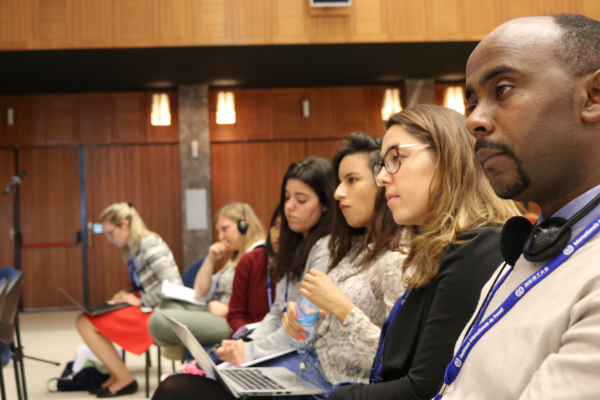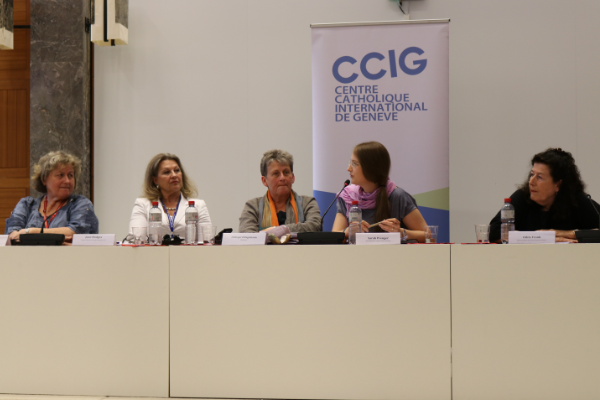Rethinking Social Dialogue in times of Globalization and Informalization (3 August 2018, Geneva)

Background of the NGO workshop entitled “Tripartism plus – Rethinking Social Dialogue in times of Globalization and Informalization”
This activity was jointly organized by the International Catholic Centre of Geneva (CCIG), Kolping International, the German Commission for Justice and Peace (GCJP), the International Coordination of Young Christians Workers (ICYCW), International Young Christian Workers (IYCW), and the World Movement of Christian Workers (WMCW), with the collaboration of Women in Informal Economy: Globalizing and Organizing (WIEGO). Furthermore, the event was made possible with the support of the World Council of Churches (WCC).
Since its inception, the ILO has recognized the importance of Social Dialogue as a key tool to address violations and effectively promote Decent Work. Accordingly, the Agenda of the 107th International Labour Conference, held in Geneva from 28th May to 8th June 2018, included a discussion on the strategic objective of Social Dialogue, as one of the four pillars of the ILO’s decent work concept. The ILO stresses the vital role of dialogue between governments, and workers’ and employers’ organizations to promote and maintain peaceful and prosperous societies.
Social Dialogue includes all types of negotiation, consultation and exchange of information between or among representatives of governments, employers and workers on issues of common interest relating to economic and social policy.
Social Dialogue can act as a mortar to keep society together. With it, an economy may survive crises with less damage. It is helpful to promote reconciliation after conflict and it is necessary to identify and implement effective and fair solutions after accidents (e.g. development of new fire and safety regulations in Bangladesh/Pakistan). Social Dialogue is crucial for the strengthening of equality e.g. by ensuring action at different levels to promote gender equality, non-discrimination, and Decent Work). Social Dialogue gives people a voice and a stake in their societies and workplaces. It is, therefore, central to the functioning of the ILO itself.
Nevertheless we see critical and increasing deficits in the commitment to Social Dialogue at all levels. Government structures are often weak and lack resources. In many countries the private sector refuses to recognize its importance. Labour movements are often too fragmented and weak to participate effectively. Social Dialogue is also often challenged by strong economic interests. How can we counteract these weaknesses, especially in the light of globalization with its complex Global Value Chains, global markets and global competition that often promote informal, precarious and cheap labour? What about outreach to the informal economy? How can we ensure the inclusion of “vulnerable groups”, such as migrants, women, care and domestic workers? How can we include casual and contracted workers, be it in agriculture and construction or “fake“ self-employment in IT and services?
Is the classical tripartism (Workers, Employers and Governments) enough? How can we also include other actors within the Social Dialogue process, e.g. NGOs, religious, humanitarian and consumer groups? Will this expansion of Social Dialogue contribute to better working conditions for all? Whose responsibility is it to call for reinforced Social Dialogue? Will tripartite-Plus approaches strengthen or weaken traditional tripartite structures?
In conjunction with the 107th International Labour Conference, this event intended to raise awareness about opportunities and challenges associated with Social Dialogue, highlighting its potential and limits in our societies, as well as to facilitate a creative discussion on the different positions and approaches to reinforcing Social Dialogue within and beyond the ILO, at the national and local level. The event also focused on cases where Social Dialogue is important to create new understandings of the need to protect informal workers and other vulnerable groups in precarious work situations.
The coalition of organizing NGOs believes Social Dialogue is a critical instrument for advancing the rights and protections of workers in the informal economy that should be at the forefront of advocacy efforts on the issue.
This workshop convened prominent members of civil society, the ILO, and actors in the field, to create a space for dialogue among concerned stakeholders and advocates.
Participants had the opportunity to hear testimonies from NGOs working at local level and from experts at the international level, as well as the chance to contribute their own experience to the discussion.


